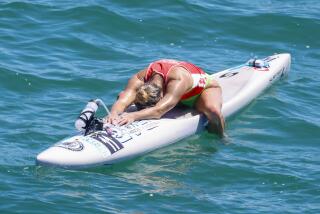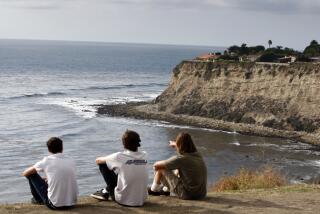Court Returns America’s Cup Trophy to San Diego
- Share via
The Appellate Division of the New York Supreme Court fired a torpedo into New Zealand’s claim on the America’s Cup on Tuesday and returned sailing’s most coveted trophy to the San Diego Yacht Club.
The five judges, after deliberating for 3 1/2 months, voted 4 to 1 that San Diego’s 60-foot catamaran was a legal defender when Dennis Conner sailed it to two easy victories over New Zealand’s 130-foot monohull boat last September. That reversed a March 28 ruling by New York Supreme Court Judge Carmen Ciparick, who had awarded the cup to New Zealand’s Mercury Bay Boating Club.
Tuesday’s ruling was almost as lopsided as those races, which Conner won by 18 minutes, 15 seconds and 2 1/2 miles over a 40-mile windward-leeward course and by 21 minutes, 10 seconds and 4 1/2 miles over a 39-mile triangular course. Although Conner sailed cautiously, the margins were great enough to give substance to a claim by New Zealand syndicate chief Michael Fay. He had complained that the races were a mismatch and contrary to the spirit and letter of the 19th-Century deed of gift that governs America’s Cup competition.
Ciparick agreed, shocking the sailing world with her bold decision.
Now that she has been overturned, however, Fay said Tuesday he will pursue his case to the next and last station: the New York Court of Appeals. Since the cup is held as a charitable trust by the state of New York, it is not an appropriate issue for the Supreme Court of the United States.
“If I could go the U.S. Supreme Court, I think I would,” Fay said in a satellite TV interview from his high-rise office in Auckland, overlooking the bay where the races would have been staged in 1992. “New Zealand’s resolve is as strong as ever. Perhaps our confidence is shaken just at this moment. Our determination hasn’t changed. You won’t see New Zealand giving up on the America’s Cup, either now or in the future.”
Fay felt he was double-crossed when San Diego answered his challenge with a catamaran--inherently a much faster boat than a monohull. The New Zealand merchant banker said he had already ordered his American lawyers in New York to move on an appeal. If the ruling Tuesday had been by a 3-2 vote, one would automatically be granted, but since the vote was 4 to 1 he must petition the court.
According to Mark Smith of the San Diego law firm of Latham & Watkins that represents the San Diego Yacht Club, only two of the seven judges on the Court of Appeals must agree to grant an appeal--”but the statistics are that in 1988 they granted less than 15% of the requests,” Smith said.
George Tompkins Jr., who represents Fay, said the request for an appeal must be filed within 30 days but agreed with Smith that it has “a one in 10 chance” of being heard.
Tom Ehman, executive vice president of San Diego’s America’s Cup Organizing Committee, said: “This decision makes an appeal by Michael Fay very unlikely, meaning that it’s very likely that the defense of America’s Cup 28 (the 28th race) will occur right here in San Diego, where it should have been all along.”
Francis Radford, vice commodore of the San Diego Yacht Club, said he thought Mercury Bay’s chances of winning on appeal were “slim and none.”
Commodore Patrick Goddard was said to be in Britain on business but planned to retrieve the cup in New York on his way home this week. During the appeal process, it was temporarily restored to the custody of the New York Yacht Club, which placed it in a vault at Morgan Guaranty Trust Co.
If the judgment stands, the Auckland merchant banker will be coming to San Diego as a challenger in 1992, as he first plunged into the fierce world of cup competition at Fremantle, Western Australia, in 1986.
San Diego has received 24 challenges from 11 countries, including the Soviet Union, Japan and others that would be competing for the first time. Eliminations for defenders and challengers are scheduled to start in January of 1992, with the finalists meeting in May.
Only two Americans have indicated that they will compete for the right to defend the cup: Conner and Peter Isler, who was Conner’s navigator at Fremantle. Ehman of the organizing committee said he intends to meet soon with other potential American challengers to encourage participation and strengthen the defense.
“Some of the challengers are already building boats,” Ehman said.
The drawback to most is that they would be defending the cup not for their home yacht clubs but for San Diego.
Three of the judges--Joseph P. Sullivan, E. Leo Molinas and Richard W. Wallach--based their decision on a different interpretation than Ciparick had given to the deed of gift, which was written by cup donor George L. Schuyler Jr. in 1887. A fourth judge, Israel Rubin, also voted to overturn Ciparick but for different reasons.
Sullivan, the presiding judge, wrote in the 49-page opinion: “The deed of gift is silent as to the type of boat to be used by the defender . . . (and) does not specifically bar the use of a multihulled vessel . . . nor is there any express mandate that the competing vessels be identical or even substantially similar.”
Further, Sullivan wrote, “In finding that the vessels must be ‘somewhat evenly matched,’ the court (Ciparick) promulgated a rule that is neither expressed in, nor inferable from, the language of the deed of gift.”
Fay had based part of his case on sportsmanship, which is addressed in the deed of gift only in referring to the purpose of the cup as “friendly competition among foreign countries.” The judges differed on that point also.
The lone dissenting opinion by Judge Bentley Kassal was that “the 1988 America’s Cup races were manifestly unfair in every sense.”
Rubin’s separate opinion contained rambling references to hockey and fox hunting but conceded that “. . . Stars & Stripes’ victory was virtually ensured . . . (but) I cannot agree with the proposition that the America’s Cup competition is now, if it ever was, a paradigm of good sportsmanship.”
Sullivan also wrote: “This language . . . imposes no affirmative obligation on the trustee to use any particular type of vessel . . . (and) if any inference is to be drawn, it would be that the donor intended to afford the defender a limited initial advantage. . . . Other than a water-line length limitation, the deed does not contain any design constraints.”
Fay said: “If the majority ruling of the judges was to stand, then the defender has a built-in, unbeatable advantage . . . guaranteed to beat the (challenger). This majority ruling is a disgrace to sport. The America’s Cup has no future . . . if these are the rules that govern the competition.”
Several prospective competitors, including San Diego and New Zealand, signed a protocol written at San Diego last year that they would not pull such shenanigans in future cup races and that everybody would sail similar boats--a new “America’s Cup” class of monohulls larger and faster than the 12-meters used since World War II, but Fay does not trust them.
Times staff writer Michael Granberry contributed to this article.
RELATED STORY: Sports, Page 1.
More to Read
Sign up for The Wild
We’ll help you find the best places to hike, bike and run, as well as the perfect silent spots for meditation and yoga.
You may occasionally receive promotional content from the Los Angeles Times.






